GSK settles 80,000 lawsuits over Zantac-cancer link for $2.2B
The manufacturer of popular over-the-counter heartburn treatment Zantac has settled multiple lawsuits in the U.S. brought by plaintiffs who claimed a discontinued formula for the drug caused cancer.
GSK, formerly known as GlaxoSmithKline, has agreed to pay $2.2 billion, which will settle most—but not all—of the over 80,000 cases brought against the British drug developer. The company said the settlement fund will resolve 93% of pending litigation against GSK over harms caused by Zantac.
In addition to the settlement, the company also is paying $70 million to a whistleblower at a laboratory in Connecticut who made some of the initial claims against GSK.
The cases were mostly granted class-action status and litigated by 10 law firms in multiple states, representing tens of thousands of plaintiffs who signed on to the lawsuits.
As part of the deal, GSK does not admit to wrongdoing and does not concede Zantac caused cancer. In a statement, the company said there was “no consistent or reliable evidence” that the active ingredient in Zantac, ranitidine, was linked to cancer or increased patients’ risk of developing cancer.
Zantac, first introduced in the U.S. in 1983, also was produced and sold by Pfizer and Sanofi. Both companies have now settled most of the complaints related to their role in manufacturing and selling Zantac that contained ranitidine.
The U.S. Food and Drug Administration (FDA) first warned the public about carcinogens in Zantac in 2019.
Cases in Delaware in California still being litigated
According to an update from Wisner Baum, the attorneys representing the plaintiffs, some 72,000 remaining cases against pharmaceutical companies are scheduled to move forward in Delaware. A judge approved those to move to trial back in May. That decision is being appealed in the state Supreme Court.
Another case brought in California has reached the jury selection phase. Opening statements are expected to begin as soon as that moves to trial.
The list on the status of pending litigation can be found here.

